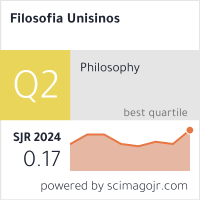Socrates on being good
DOI:
https://doi.org/10.4013/fsu.2020.212.01Resumen
The main aim of this paper is to present an interpretation of what Socrates understood by being good for a human being. Starting from the evidence in the Symposium that Socrates himself was a phronimos and sophron person, I seek to show how Socratic ethics is centered on the thesis of the (1) identity of virtue and knowledge, which I articulate with the theme of (2) Socratic ignorance, and (3) the role of Socrates as an educator, to display how Socrates attempted to help people to improve themselves. In order to explore the core of Socratic moral thought, I take into account Penner’s explanation of Socratic intellectualism endorsing his description of what being good for a person means, but not following his conclusions. Then I argue that even if Socrates had held moral beliefs and been to a certain degree wise and virtuous, the moral knowledge, virtue, wisdom or the science of the good that only the gods completely master should not be ascribed to him. Socrates often made profession of ignorance. In the Apology, the knowledge that he admits to having and that makes him wiser than the others is “human wisdom”, that is, the recognition of his own ignorance and, in general, human ignorance about how to live well. Endowed with this self-knowledge, Socrates assumed the educational task to try to free people from the worst ignorance: not to know and to think that you know. Through philosophy practiced as examination by refutation (elenchos), he did his best to lead his fellows to self-knowledge, to take care of their souls, to dedicate themselves to phronesis, truth, and perfection of soul, in sum, to be prudent; this is the only way in which a person would do well, be good and happy.
Keywords: Socrates, virtue, knowledge, being good.
Descargas
Descargas
Publicado
Cómo citar
Número
Sección
Licencia
Concedo a revista Filosofia Unisinos – Unisinos Journal of Philosophy o direito de primeira publicação da versão revisada do meu artigo, licenciado sob a Licença Creative Commons Attribution 4.0 (que permite o compartilhamento do trabalho com reconhecimento da autoria e publicação inicial nesta revista).
Afirmo ainda que meu artigo não está sendo submetido a outra publicação e não foi publicado na íntegra em outro periódico e assumo total responsabilidade por sua originalidade, podendo incidir sobre mim eventuais encargos decorrentes de reivindicação, por parte de terceiros, em relação à autoria do mesmo.










